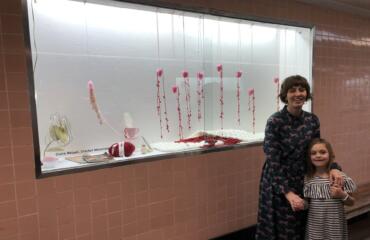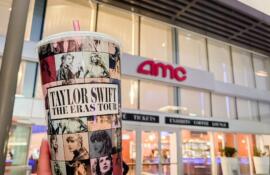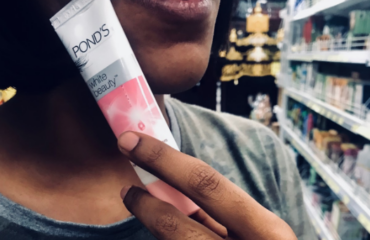THE candidate knocks on the door’s aluminium frame. He says you can always tell it’s a housing commission door by the style. The metal knocker clangs and the mesh screen beneath it rattles.
“You can’t see through the mesh so if the door doesn’t open you have no idea who you’re talking to,” he says, explaining the awkwardness of the cold call. “You can’t even see the height of the person you’re addressing. You don’t know if you’re talking above them.”
On this winter’s morning, the candidate is rapping his knuckles on the doors of state-provided housing in Heidelberg West, about 10 kilometres north of Melbourne’s CBD.

“G’day,” he says, thrusting his hand towards the cautious resident on the other side of the screen. “Just introducing myself: Nick McGowan, Liberal candidate for the federal election.”
The 38-year-old McGowan is running in Jagajaga, the electorate that starts here and sprawls east. It is among the 30 safest Labor seats, and has been held by the ALP since its creation in 1984, with Jenny Macklin at the helm for the past 17 of those 29 years.
Even in these days of Labor in-fighting and opinion polls that reveal record levels of voter disenchantment more broadly, McGowan’s is an uphill battle. Though not perhaps an impossible quest, he needs an 11.5 per cent swing in order to claim victory.
“This is what the ALP calls their heartland,” he says, with a note of resignation. “I joke about it. I say: ‘You gotta be insane — partially insane — to do this’.”
McGowan recounts the very first time he knocked on a door as a freshly-endorsed Liberal candidate, introducing himself to a man in his 50s who took his introductory card but responded bluntly “I hope you lose,” before his wife emerged to slam the door in McGowan’s face.
“The third house I visited, the lady visibly shuddered when I said I was the Liberal candidate, but she still took my card . . . that’s the start of your day.”
“I joke about it. I say: ‘You gotta be insane — partially insane — to do this’.”
One of the hazards of door-knocking in a housing commission estate is that many residents do not have English as their first language, says McGowan, so there’ll be a higher number of people who are reluctant to answer the door. He says that usually about one-in-three doors are opened when he knocks.
“The idea is to be meeting people,” he says, explaining the rationale behind what appears a thankless and near-futile task. “People like to see the candidate.”
McGowan is tall but his physical stature does not seem imposing. He wears a bright yellow T-shirt with his name printed in blue, pulled over a business shirt. A blue ‘NICK MCGOWAN’ rain-jacket and a badge on his chest displaying a heart and Heidelberg West’s postcode completes the campaigning ensemble.

Running in Jagajaga requires a good dose of realism, says McGowan, but he hopes that the cynicism of voters plays to his advantage. He says elected representatives in safe seats can often take the electorate for granted, not truly reflecting the views of their constituency. His mantra is that Labor has done nothing to earn the vote of the “forgotten people of Jagajaga”.
Cynical voters are one thing, but McGowan accuses his political opponents of equal cynicism, claiming that during a redistricting spat Labor “fought tooth and nail to keep Heidelberg West in the electorate” because of the suburb’s council-housed constituency.
And he accuses the incumbent Macklin of never having gone door-knocking during her tenure. “Because it has been an ALP seat for so long, you don’t see them anymore,” he says. As a result, voters’ issues had not been properly addressed.
He recalls: “One lady has been here 60 years and never had any candidate knock on her door before.” Another woman had responded that McGowan was the third candidate to knock unannounced – although the first two were state politicians, the former Member for Bundoora, John Cain, and the current Member for Bulleen, Liberal Nick Kotsiras.
“I laughed and said ‘Well I hope this is a good omen because the other two got elected’,” McGowan sighs. “You take a glimmer of hope wherever you can get it.”
McGowan relates his own family story to the tales of housing troubles that greet him in the commission. Born locally, in Ivanhoe, his mother and father divorced when he was three years old. With his mother and brother, McGowan moved homes 17 or 18 times before his 18th birthday. “Every 12 or 18 months you get up and you’re off again . . . some weeks not having enough money for food.”
“I don’t want to be just another man in a suit. I hate dressing up in a suit. I love T-shirts.”
He believes that sobering experience instilled in him empathy for many of the people who he is now seeking to represent. “This is one of the first times you’ve got a Liberal who has familiarity with the stories he is hearing,” McGowan continues. “You want someone who grew up here. Jagajaga has never had a member who was born here and raised here in this seat . . . hopefully it is part of the appeal.”
It’s not just long-time residents McGowan hopes to charm with his story, believing he is able to find common ground with many of the African immigrants who have come to call Heidelberg West home. On joining the United Nations in 2001, McGowan was dispatched to the Republic of Congo, Burundi and a war-torn Liberia working in policy and public affairs. Later, he assisted the UN mission in Afghanistan and the Iraqi mission from Cyprus.
Meeting Sarah, a Sudanese immigrant, McGowan mentions the name of one of his three daughters Aysha, “who was Mohammed’s favourite wife”, before they muse over the beauty of mosques in Damascus.
After a stint with the UN in New York, McGowan joined then-State Opposition leader Ted Baillieu in 2005 as a media advisor, rekindling a party loyalty first fashioned in student politics at La Trobe University. He was previously an adviser to Jeff Kennett.
Reflecting on his door-to-door tour of the electorate, McGowan says: “You walk places that you haven’t been for years. When you were younger you rode your bike around everywhere and got to know every street and every shortcut. It has been a real re-discovery for me.”
But the task is one of grind, requiring a thick skin. Some of the doors that McGowan approaches are covered in hostile signs warding off potential knockers. Sometimes, he’ll knock anyway, confident in the message he has to sell. Truth is, many candidates, are too easily put off.
“Ninety-nine per cent of candidates don’t knock,” he surmises. Often, it’s because they are intimidated and don’t know what to say when they’re challenged on unfamiliar issues. “I’ve had a number of people in the last few weeks take me to task on every issue you can imagine.”
McGowan reckons too few sitting members get into the nitty gritty of their electorate, too readily defining issues as state or federal “instead of saying ‘I’ll write the letter for you, and at least get the ball moving’.”
“If they change their minds, then this seat comes into play. And when I say to them ‘You’re going to decide this’, I’m deadly serious. They are the most important people to me in this election. Without getting on my knees and begging, these people are deciding my future.”
The opportunity to put his money where his mouth is soon presents itself as McGowan walks through Heidelberg West’s Mall, an outdoor shopping strip where takeaway food stores break up a procession of opportunity shops. Several locals talk to him about menial issues such as policing poor parking behaviour nearby. For others, public restrooms at one end of the shops are too far away: another set is needed.
McGowan jots requests in a little notebook that he juggles with a stack of business cards. He insists he takes people’s issues to heart and will draft letters to council members after dinner. His rationale for doing so is articulated bluntly: “If you don’t follow it up then they think ‘Oh this guy, he’s a bullshit artist’.”
McGowan concedes there are limits to what he can achieve. “But in saying that, the most powerful thing I have is that I am a candidate. I am endorsed by the party. I use it every day. I write letters every day saying ‘Look, can you help out here?’ ”

On his ambition more precisely, he adds: “We’re winning it one vote at a time. I’ve gotta change one-in-nine.” It is a reference to Macklin’s 2010 majority: McGowan must convince one in every nine of Jagajaga’s 90,000 voters to switch allegiance to him to be able to upset Macklin, who took the seat with a two-party preferred majority of 61.52 per cent. “If I had enough time I’m convinced I could bloody win it. But it’s gonna take a God almighty bloody effort.”
With both major parties fixated on marginal seats in the September 7 election, McGowan expects to enjoy a great deal of autonomy in his campaign to wrest control of the Labor stronghold. But that freedom comes at a cost, with the Liberal Party applying its financial muscle to winnable seats, not to seemingly audacious battles such as the one McGowan now wages.
“Being a candidate is an act of self-harm – financially, anyway,” McGowan gripes in reference to party funding. “If the marginal seats are going to fall they’re going to fall. They could put the money elsewhere.”
He has little of his own funds, nor the back-up enjoyed by incumbents with their full-time staffers. Instead, McGowan relies on shoe leather: going door-to-door is his way of competing with a cashed-up electoral machine. That fact is underscored when local resident Donna asks McGowan at the end of their chat: “Where’s your office?” To which the candidate responds, swinging his arms open: “You’re looking at it.”
To fund his campaign he’s organised trivia nights, a garage sale and hosted dinners. But it’s a slog. “You don’t have enough money to send out brochures,” he concedes. “If you’re not sending out brochures you’re not communicating. If you’re not communicating no one’s going to vote for you.”
Because he is not subject to the same level of top-down party pressure that would be applied to candidates running in a marginal seat, McGowan believes he has more freedom to be himself. “I don’t want to be just another man in a suit. I hate dressing up in a suit. I love T-shirts,” he says.
“Most of the party can’t stand it. They think this is being a rebel within the Liberal Party because I’m wearing a T-shirt. I’ve been to party functions with 500 people, all suit and tie and I’m the only one with a T-shirt on. I’ve been the butt of all sorts of remarks and everything. I don’t care. Campaign’s on guys.
“You’re not at some lawyer’s convention or some 500-person wake. Loosen up. You can be serious but you don’t have to be in a strait-jacket the whole time.”
But McGowan often checks his pitch while on the hustings, his no-frills introduction written the same each time he leaves his business card poked into unanswered doors. “Sometimes I think about writing something quirky or whatever, but it only takes one person to take offence and you look like a dick. So I leave it pretty bland.
“Sometimes I’d like to write ‘Beautiful garden’. [But] you don’t want someone writing to the paper and saying ‘This smart arse is taking the piss’.”
Yet, a cautious presentation can only stave off so much antagonism — many of McGowan’s campaign posters on display in the electorate have been vandalised. “In one case they shredded a sign into tinsy winsy little pieces and had strewn it all over a front yard,” he says. “One or two’s fine, [but] we’ve had umpteen. If you had limitless bloody money you wouldn’t care. Some of the people putting up signs are 83, 84-year-old ladies. And they get scared.”
McGowan sees it as an attack on the Liberal brand in a traditional Labor stronghold, and not personal. Sure, there are negatives, but people generally are civil. And he takes pride in having been told that the ALP has noted how hard he is running. Labor is cranking up its campaign in response, he believes.
McGowan suggests it is a sign that Labor has been taking the Jagajaga electorate for granted, acting only when prodded. It feeds his shtick, that power resides with voters. “If they change their minds, then this seat comes into play,” he says. “And when I say to them ‘You’re going to decide this’, I’m deadly serious. They are the most important people to me in this election. Without getting on my knees and begging, these people are deciding my future.”
At which point, the penny drops for resident Donna. “You’re a Liberal?” she twigs. “Oh, I’ve not been happy with the Labor Party at all, but I’m normally Labor, been voting Labor my whole life. But I’m not happy.”
It is manna from heaven for the candidate, who describes Donna and her like as the embodiment of political disenchantment. “They’re not swinging voters, they’re Labor people,” he insists. “They’re leaving [Labor].”
But in another moment of reflection, McGowan talks about his make-or-break political quest with resignation. “The great fear for me is ‘If you lose, what the hell do you do?’ ” he says. “I don’t have a plan B.
“People in the party who I’m friends with and who I trust were very keen for me to stand for [the electorate of] Deakin because it’s the most marginal Liberal-held seat in the state.
“I chose not to, and it’s funny and maybe on election night I’ll . . . ” His voice trails off, before the candidate adds. “I’ve done the right thing. You don’t always get rewarded for doing the right thing.”



